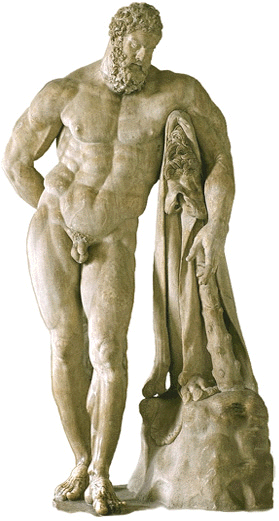...Best of Sicily presents... Best of Sicily Magazine. ... Dedicated to Sicilian art, culture, history, people, places and all things Sicilian. |
by Ignazio Lo Verde | ||
Magazine Index Best of Sicily Arts & Culture Fashion Food & Wine History & Society About Us Travel Faqs Contact Map of Sicily |
While the mythical hero relied upon his strength to accomplish his "Twelve Labors," he was not above employing slyness as well as legitimate ingenuity in achieving something. This contradicts the modern stereotype of the majority of exceptionally muscular men as dolts lacking in intelligence and reason. Much has been written of Hercules, and much attributed to him over the centuries. Here we'll cast a glance toward the adventure of the Greek hero in Sicily. It began off the coast of Spain. Geryon lived on the island of Erythia, where he kept a herd of unique red bulls. These were guarded by Eurytion, his herdsman, with the aid of Orthus, a fearsome two-headed dog (brother of Dante's Cerberus). Arriving in the vicinity, Hercules broke into two a mountain at the entrance of the Mediterranean (the Strait of Gibraltar) to form the Pillars of Hercules. Upon seeing Hercules in his domain, Orthus attacked him. Hercules killed both Eurytion and the dog by clubbing them over their heads. Geryon learned of this and attacked Hercules just as he was escaping with the cattle. Hercules shot him dead with an arrow. Now Hercules had to get the herd back home to Greece. This, however, was easier said than done. En route through Calabria a bull escaped and jumped into the Ionian Sea, and swam over to Sicily across the Strait of Messina. For the moment, Hercules left the rest of the herd to the care of the god Hephaestus (Vulcan), identified with the Aeolian (Lipari) islands and Mount Etna, and went in search of the wayward bull. In the meantime, the escaped bull was found by Eryx, king of the Hellenized Elymians of Erice, who added him to his own herd. As Eryx would have been a son of Aphrodite and King Butes of the Elymians, Virgil identifies him as a brother of Aeneas. According to Diodorus Siculus, Eryx received Hercules and challenged him to a wrestling match to decide the bull's ownership. He lost to Hercules three times. Hercules killed him and took back the fugitive bull. Though his troubles did not end in Sicily, Hercules eventually made it back across the Ionian to Greece with the precious herd.
About the Author: Ignazio Lo Verde lectures on Greek classics and other subjects. | |
Top of Page |
 In Greek mythology, Hercules ( Heracles) was the son of Zeus (king of
the gods of Mount Olympus) and the mortal Alcmena. The Romans constituted
what was probably his largest cult, spreading his renown across their Empire
and embellishing him with some traits borrowed from Etruscan culture. A
city was named for him (Herculaneum, near Pompeii). He was famous for his
strength, and much of our modern iconography regarding masculine images
of muscular development is rooted in the myth of Hercules as prototype.
In Greek mythology, Hercules ( Heracles) was the son of Zeus (king of
the gods of Mount Olympus) and the mortal Alcmena. The Romans constituted
what was probably his largest cult, spreading his renown across their Empire
and embellishing him with some traits borrowed from Etruscan culture. A
city was named for him (Herculaneum, near Pompeii). He was famous for his
strength, and much of our modern iconography regarding masculine images
of muscular development is rooted in the myth of Hercules as prototype.